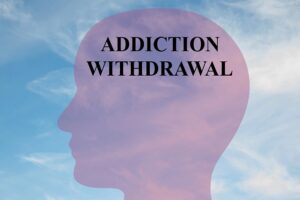Withdrawal symptoms can be uncomfortable and even dangerous, which is why it’s important to know how to cope with them. Withdrawal symptoms vary depending on the substance, but there are some common ways to manage them. We’ll be taking a look at how to cope with withdrawal symptoms and where you can get help for you and your loved ones at Magnolia City Detox.
What are Withdrawal Symptoms?
 Before a person can learn to cope with withdrawal symptoms, it’s important to understand what these are. Withdrawal symptoms are the physical and mental symptoms that occur when someone who is addicted to a substance suddenly stops using that substance. Withdrawal can be uncomfortable and even dangerous, so it is important to seek professional help if you or someone you know is experiencing withdrawal symptoms.
Before a person can learn to cope with withdrawal symptoms, it’s important to understand what these are. Withdrawal symptoms are the physical and mental symptoms that occur when someone who is addicted to a substance suddenly stops using that substance. Withdrawal can be uncomfortable and even dangerous, so it is important to seek professional help if you or someone you know is experiencing withdrawal symptoms.
The symptoms of withdrawal vary depending on the substance that was being used. For example, someone withdrawing from alcohol may experience tremors, while someone withdrawing from opioids may experience severe muscle aches. However, here are a few common/general symptoms to look out for:
- Nausea and/or vomiting
- Diarrhea
- Muscle and bone aches
- Chills
- Fatigue or exhaustion
- Restlessness
- Vivid nightmares
- Flu-like symptoms
- Headaches
- Heart palpitations
- Excessive sweating
- Shaking
- Psychological effects (paranoia, depression, confusion, irritability, etc.)
If you recognize any of these symptoms in a loved one, they may be suffering from drug addiction. It may be time to look for professional help, look no further than Magnolia City for safe and quality addiction treatment.
Safe Ways of Coping with Withdrawal Symptoms
 Withdrawal symptoms can be uncomfortable and even dangerous at times, so it is important to cope with them in a safe and healthy way. There are several practices that can help create a healthy foundation to avoid relapse and continued drug use. Learning how to cope with withdrawal symptoms is extremely important during and after addiction recovery. Here are a few healthy ways of coping with withdrawal symptoms.
Withdrawal symptoms can be uncomfortable and even dangerous at times, so it is important to cope with them in a safe and healthy way. There are several practices that can help create a healthy foundation to avoid relapse and continued drug use. Learning how to cope with withdrawal symptoms is extremely important during and after addiction recovery. Here are a few healthy ways of coping with withdrawal symptoms.
1. Get Plenty of Rest and Sleep
One of the best ways to cope with withdrawal symptoms is to get plenty of rest and sleep. When you are well-rested, your body is better able to handle the physical and emotional challenges of withdrawal. Healing and emotional health depend on getting enough sleep. When you’re well-rested, it’s easier for your mind to stay clear so that mood swings or cravings.
These are two extremely important elements of coping with withdrawal symptoms and cravings. Always make sure you are getting enough sleep by creating a structured sleep schedule and sticking to it, your body will thank you for it.
2. Drink lots of fluids, Especially Water
Another way to cope with withdrawal symptoms is to drink lots of fluids, especially water. This will help to flush the toxins out of your system and keep you hydrated. When quitting alcohol, it’s common for the body to experience dehydration. One of the most important things you can do during this time is to drink plenty of water so that your system has enough fluids and nutrients necessary in order to heal from all those toxins being eliminated.
3. Eat healthy foods
Another key element of successfully managing withdrawal symptoms is what you put in your body. What you eat can also affect how you feel during withdrawal. Eating nutritious meals and staying hydrated will help your body recover from the effects of withdrawal. Avoiding processed foods and sugary drinks can also help reduce symptoms.
When you are withdrawing from drugs or alcohol, it is important that your body has the nutrients necessary for efficient functioning. Replacing these with healthier alternatives will help speed up healing time and ensure a better quality of life during withdrawal. It can also help to take vitamin supplements as well to replenish the vitamins that may have been depleted during the addiction phase. When it comes to your mental and physical state during withdrawals, it’s extremely important to pay attention to what you are eating.
4. Avoid Caffeine, Alcohol, and Other Drugs
When dealing with drug withdrawals, you may be tempted to lean on caffeine or even alcohol to cope, however, this can end up making your symptoms even worse. Caffeine, alcohol, and other drugs can interact with withdrawal symptoms and make them worse. Avoiding these substances will help you cope with withdrawal more effectively. Relying on alcohol in particular can be a recipe for disaster, as in some cases a person might fall dependent on alcohol to cope with the withdrawal symptoms.
5. Exercise Regularly
Getting regular exercise is another great way to cope with withdrawal symptoms. Exercise helps to release endorphins, which can improve your mood and help to reduce stress levels. Exercising regularly can also reduce stress and tension, which in turn can make a person sleep better and enhance their self-esteem. Something as simple as taking a walk or jog at the beginning or end of your day can make a huge difference in how you feel and sleep. This will create stability and routine to avoid the uncomfortable feelings of withdrawal.
6. Take Deep Breaths and Do Relaxation Exercises
Deep breathing and relaxation exercises can help to reduce stress and anxiety. These techniques can also help to ease symptoms of withdrawal. Learning to regulate your breathing and slow down the thoughts in order so you can relax may help reduce anxiety or other negative emotions. Spa treatments are also known for their ability to enhance relaxation, which is something that’s really important when it comes time for a break from life’s stresses. Stress can be a very negative force when it comes to withdrawals and staying clear of relapses.
7. Distract Yourself with Activities You Enjoy
Withdrawal symptoms can be difficult to cope with, but there are things you can do to make the process easier. Distracting yourself with activities you enjoy can help take your mind off of the discomfort and help you relax. Having hobbies and activities can help you stay productive while managing withdrawal symptoms. Reading a book, writing, drawing, taking a walk, hanging out with friends or family, and picking up an instrument are all activities you can do.
8. Connect with family and friends for support
Spending time with loved ones is also a great way to take your mind off of withdrawal symptoms and feel supported during this difficult time. In order to better understand themselves, people often reach out and talk with family members or friends. In the process of talking it’s helpful for externalizing thoughts that can be difficult such as feeling sad sometimes because this helps you cope instead of bottling those emotions up inside without releasing them into something else which could make things worse.
9. Join a support group
Joining a support group can provide you with invaluable information and support from others who have gone through the withdrawal process. When you’re new to sobriety or early on in treatment, it can be difficult to know what steps are right for your recovery. Groups like 12-Step programs and peer support groups (such as Alcoholics Anonymous or NA) offer encouragement from other members who’ve been there themselves – they’ll have the experience to help you and your loved ones. Support groups can also create routine and invaluable information on how to cope with withdrawal symptoms.
10. Seek Professional Help
Withdrawal is not just physical, it can also be mentally and emotionally painful. Without proper treatment for this condition, symptoms may come up with dangerous or fatal outcomes in some cases. Some people may be hesitant to get proper help, but sometimes professional help is the best course of action. Seeking professional treatment is the best way to go. At Magnolia City Recovery, we offer a wide variety of professional treatment programs and therapy options for you and your family.
Getting Help at Magnolia City Recovery
Staying busy during withdrawal can help distract from uncomfortable symptoms and cravings. Magnolia City Detox offers addiction treatment programs that can help address the underlying causes of addiction and provide tools for coping with withdrawal symptoms. If you or a loved one is suffering from addiction, it may be time to reach out for help. Knowing how to cope with withdrawal symptoms is only part of the process.
We have several treatment programs dedicated specifically to you and your needs. We specialize primarily in detox but we offer other resources as well. Medical detoxification is a process in which the body is cleansed of toxins. This can help reduce withdrawal symptoms and make them more manageable. Some of the cases we treat include:
Don’t wait for things to get worse, give us a call to get started on your journey toward a better life.

















